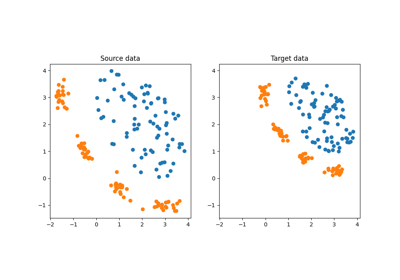skada.GaussianReweightAdapter
- class skada.GaussianReweightAdapter(reg='auto')[source]
Gaussian approximation re-weighting method.
See [1] for details.
- Parameters:
- reg'auto' or float, default="auto"
The regularization parameter of the covariance estimator. Possible values:
None: no shrinkage.
'auto': automatic shrinkage using the Ledoit-Wolf lemma.
float between 0 and 1: fixed shrinkage parameter.
- Attributes:
- `mean_source_`array-like, shape (n_features,)
Mean of the source data.
- `cov_source_`array-like, shape (n_features, n_features)
Mean of the source data.
- `mean_target_`array-like, shape (n_features,)
Mean of the target data.
- `cov_target_`array-like, shape (n_features, n_features)
Covariance of the target data.
References
[1]Hidetoshi Shimodaira. Improving predictive inference under covariate shift by weighting the log-likelihood function. In Journal of Statistical Planning and Inference, 2000.
- fit(X, y=None, *, sample_domain=None)[source]
Fit adaptation parameters.
- Parameters:
- Xarray-like, shape (n_samples, n_features)
The source data.
- yarray-like, shape (n_samples,)
The source labels.
- sample_domainarray-like, shape (n_samples,)
The domain labels (same as sample_domain).
- Returns:
- selfobject
Returns self.
- set_fit_request(*, sample_domain: bool | None | str = '$UNCHANGED$') GaussianReweightAdapter
Configure whether metadata should be requested to be passed to the
fitmethod.Note that this method is only relevant when this estimator is used as a sub-estimator within a meta-estimator and metadata routing is enabled with
enable_metadata_routing=True(seesklearn.set_config()). Please check the User Guide on how the routing mechanism works.The options for each parameter are:
True: metadata is requested, and passed tofitif provided. The request is ignored if metadata is not provided.False: metadata is not requested and the meta-estimator will not pass it tofit.None: metadata is not requested, and the meta-estimator will raise an error if the user provides it.str: metadata should be passed to the meta-estimator with this given alias instead of the original name.
The default (
sklearn.utils.metadata_routing.UNCHANGED) retains the existing request. This allows you to change the request for some parameters and not others.Added in version 1.3.
- Parameters:
- sample_domainstr, True, False, or None, default=sklearn.utils.metadata_routing.UNCHANGED
Metadata routing for
sample_domainparameter infit.
- Returns:
- selfobject
The updated object.
- set_transform_request(*, allow_source: bool | None | str = '$UNCHANGED$', sample_domain: bool | None | str = '$UNCHANGED$') GaussianReweightAdapter
Configure whether metadata should be requested to be passed to the
transformmethod.Note that this method is only relevant when this estimator is used as a sub-estimator within a meta-estimator and metadata routing is enabled with
enable_metadata_routing=True(seesklearn.set_config()). Please check the User Guide on how the routing mechanism works.The options for each parameter are:
True: metadata is requested, and passed totransformif provided. The request is ignored if metadata is not provided.False: metadata is not requested and the meta-estimator will not pass it totransform.None: metadata is not requested, and the meta-estimator will raise an error if the user provides it.str: metadata should be passed to the meta-estimator with this given alias instead of the original name.
The default (
sklearn.utils.metadata_routing.UNCHANGED) retains the existing request. This allows you to change the request for some parameters and not others.Added in version 1.3.
- Parameters:
- allow_sourcestr, True, False, or None, default=sklearn.utils.metadata_routing.UNCHANGED
Metadata routing for
allow_sourceparameter intransform.- sample_domainstr, True, False, or None, default=sklearn.utils.metadata_routing.UNCHANGED
Metadata routing for
sample_domainparameter intransform.
- Returns:
- selfobject
The updated object.
